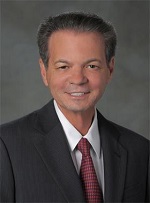Gilead Sciences ($GILD) and AbbVie ($ABBV) caught a break for their hepatitis C treatments when the FDA rescinded breakthrough designations earlier this year for potential competitors being developed by Merck ($MRK) and Bristol-Myers Squibb ($BMY). But the competitive outlook for the hep C market has shifted ever so slightly again with BMS's drug getting a new FDA breakthrough tag for two specific areas of treatment, similar to the bone that Merck got from the FDA in April.
Bristol-Myers Squibb said today that the FDA granted its daclatasvir and sofosbuvir combination for genotype 1 patients with advanced cirrhosis as well as for patients who come down with hep C genotype 1 again after a liver transplant. The designation was based on ALLY-1, a Phase III clinical trial evaluating a 12-week regimen for those two groups of patients.
 |
| Bristol-Myers' Doug Manion |
"Our daclatasvir clinical development program focuses on addressing high unmet medical needs still encountered in the treatment of hepatitis C despite the advent of new therapies," Dr. Douglas Manion, who heads specialty development for Bristol-Myers, said in a release.
Merck also recently regained a breakthrough drug designation for two narrow patient populations and may be on track to a quick approval before the end of this year. The FDA affirmed in April that Merck's grazoprevir/elbasvir combo still qualifies as a breakthrough for GT1 with end-stage renal disease on hemodialysis and patients infected with chronic HCV genotype 4.
Bristol-Myers pointed out that this is separate from the FDA's consideration of the combo drug for treatment of patients with genotype 3 hep C. The combo drug has been approved in Japan and in some countries in Europe but has yet to get an FDA nod so that it can find its place in a market that Gilead had to itself for a year before AbbVie got its combo drug approved late last year.
AbbVie is just getting started in the market, but Gilead has been selling its two treatments, Sovaldi and combo drug Harvoni, at a blistering pace. AbbVie's cocktail Viekira Pak wasn't approved until late 2014, meaning Gilead had last year almost exclusively to itself, with a lot of pent-up demand for the first oral interferon-free treatments. And it hit paydirt. The Foster City, CA, biotech reported sales of nearly $25 billion and net income of $12.1 billion, as revenues from its hepatitis C treatment superstars hit $12.41 billion in 2014.
The picture changed with the approval of AbbVie's combo. Pharmacy benefits manager Express Scripts ($ESRX), whose execs were feeling held up by the high prices that Gilead had put on its treatments, struck an exclusive discounted deal with AbbVie. That set into motion a pricing war that has led to some significant discounts from both companies.
 |
| AbbVie CEO Richard Gonzalez |
Even so, in the first quarter of 2015, Gilead reported a 52% jump in revenue with the hep C drugs contributing $4.55 billion of a total of $7.59 billion. AbbVie's Viekira posted just $138 million in U.S. sales in Q1, although CEO Richard Gonzalez assured investors that it was picking up momentum.
Bristol-Myers still needs to get its drug approved and the small patient population represented by the breakthrough won't translate into large sales, but it does suggest there are some areas where latecomers might quickly get uptake in sales.
- here's the release
Special Reports: The top 15 pharma companies by 2014 revenue - Gilead Sciences | The 25 most influential people in biopharma in 2015 - Steve Miller - Express Scripts